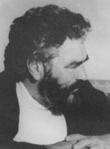The third and youngest child of Herbert Warner Cook and his Lily May (née Soole), Kenneth Cook started out his career as a journalist, initially working in country towns and Sydney for some years. While in the New South Wales capital he became involved with the Genesian theatre company, and it was through this association that he met his future first wife, librarian and researcher, Irene Patricia Hickie. In 1952 Cook secured a position with the Australian Broadcasting Commission (ABC), spending his first two years with the national broadcaster at Broken Hill, New South Wales and later Rockhampton, Queensland. He wrote his first novel in the latter town and although initially accepted it was later considered libellous and pulped. Cook was then transferred to Brisbane for six months before returning to Sydney in late 1954. During his time with the ABC Cook was often involved filming and presenting items for its television program Weekend Magazine. Cook resigned from the ABC in 1961 in order to concentrate on his writing. In later years he would again work for the broadcaster, but as a freelance producer making dozens of short films through his company, Patrician Films.
Cook's first novel, Wake in Fright, was published the same year he left the ABC. Considered his best-known novel, it was adapted into a film by Peter Weir some ten years later. During his eighteen-year career as a writer, Cook published fourteen novels, a television play (I'm Damned If I Know), two stage dramas, Habacus, one episode of the children's television adventure series The Rovers (1970), and the musical play Stockade: A Musical Play of the Eureka Stockade (which was also turned into a film).
As a writer Cook explored a wide variety of genres, including the detective story, Chain of Darkness (1962), and an historical novel about bushranging, Wanted Dead (1963). The Wine of God's Anger (1968), saw Cook reacting disapprovingly at Australia's involvement in Vietnam, while in Piper in the Market-Place (1971), he let his Catholic background rise to the surface as he moralised on the issue of abortion. Pig (1980), concerns a confrontation between a hunter and an intelligently malign animal. It has been suggested by several critics that this novel, which resembles in a number of respects the format used by Peter Benchley in Jaws, should have been called 'Tusks.' A novel about the Australian film industry, The Film-Makers, which he co-wrote with his daughter, Kerry, was published in 1983.
Sometime around 1970 Cook collaborated with his wife Patricia on a musical play about the Eureka rebellion of 1854. Stockade was also to become a vehicle for further comment on the Vietnam War, with Cook exploring the issue of the rule of law versus individual rights. His premise was to question the validity of violence as a means of control, and the play therefore contains lots of stirring comment on government oppression and the right of people to rise against injustice. Stockade was commissioned by the University of New South Wales Drama Foundation, and premiered in 1971 at the Independent Theatre, North Sydney. Immediately following the end of the Sydney season most of the cast spent two weekends at the Australiana Village at Wilberforce (New South Wales) making a motion picture version of the stage production. Although poorly received by the critics, the film version of Stockade played a significant role in highlighting the poor state of the Australian film industry - particularly the lack of action by the NSW government to protect and assist local filmmakers. In this respect Cook, and producer, Hans Pomeranz, found themselves at the forefront of a public and industry campaign to change the government's attitude regarding the enforcement of protectionist laws already in place.
Cook died in 1987 of a heart attack. He was survived by his first wife, his children, and second wife, Jacqueline Kent.


